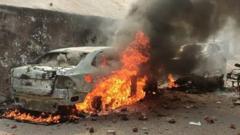Sambhal city in Uttar Pradesh is on high alert following violent clashes that left three people dead and numerous others injured on Sunday. The unrest erupted during a court-ordered survey of the historical Jama Masjid, drawing sharp reactions from local communities and igniting longstanding tensions surrounding religious sites in the area.
Protests turned violent as demonstrators reportedly burned vehicles and clashed with police, who have since detained 21 individuals related to the unrest. In an effort to restore order, local authorities suspended internet services and closed schools for a day. The survey, conducted after a petition alleged that the mosque was constructed on the remnants of an ancient temple, further escalated tensions that had been brewing since the court's initial decision.
Authorities have asserted that no live ammunition was used during the confrontation. However, multiple protesters maintain that three individuals were shot by police during the chaos. Superintendent of Police Krishan Kumar firmly stated that no lethal weapons were deployed. The violence has re-ignited discussions about the broader implications of mosque-related disputes in India, where Hindu groups frequently assert that mosques were built atop demolished temples.
The contentious survey was coordinated soon after a local court received claims about the mosque’s history, which dates back to the 1520s under Mughal rule. Critics, including local Muslim groups, expressed outrage over their lack of notification regarding the proceedings, which they argue were hastily ordered.
As tensions surged, police reported that officers were forced to use tear gas and rubber bullets to disperse angry crowds. Conversely, the opposition has accused the Bharatiya Janata Party-led state government of exploiting the situation for political leverage—an allegation officials have categorically rejected. Meanwhile, Mahmood Madani, a prominent Islamic scholar, condemned the ongoing disputes surrounding religious sites and insisted they contravene Indian law, highlighting the precarious balance of communal harmony in the region.
Protests turned violent as demonstrators reportedly burned vehicles and clashed with police, who have since detained 21 individuals related to the unrest. In an effort to restore order, local authorities suspended internet services and closed schools for a day. The survey, conducted after a petition alleged that the mosque was constructed on the remnants of an ancient temple, further escalated tensions that had been brewing since the court's initial decision.
Authorities have asserted that no live ammunition was used during the confrontation. However, multiple protesters maintain that three individuals were shot by police during the chaos. Superintendent of Police Krishan Kumar firmly stated that no lethal weapons were deployed. The violence has re-ignited discussions about the broader implications of mosque-related disputes in India, where Hindu groups frequently assert that mosques were built atop demolished temples.
The contentious survey was coordinated soon after a local court received claims about the mosque’s history, which dates back to the 1520s under Mughal rule. Critics, including local Muslim groups, expressed outrage over their lack of notification regarding the proceedings, which they argue were hastily ordered.
As tensions surged, police reported that officers were forced to use tear gas and rubber bullets to disperse angry crowds. Conversely, the opposition has accused the Bharatiya Janata Party-led state government of exploiting the situation for political leverage—an allegation officials have categorically rejected. Meanwhile, Mahmood Madani, a prominent Islamic scholar, condemned the ongoing disputes surrounding religious sites and insisted they contravene Indian law, highlighting the precarious balance of communal harmony in the region.



















